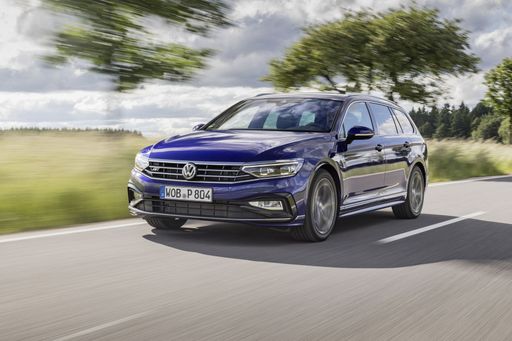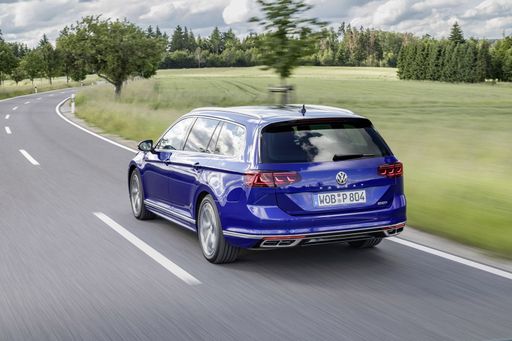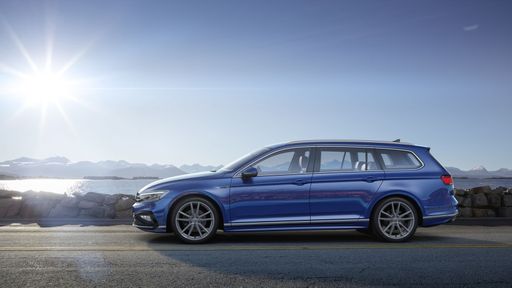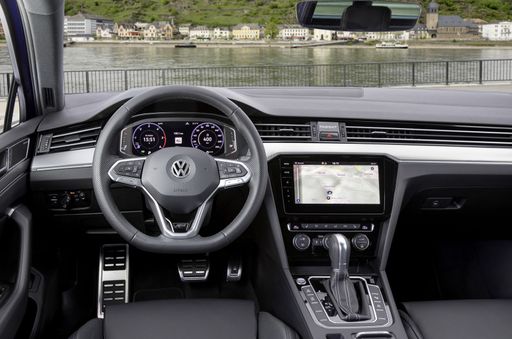Toyota C-HR vs VW Passat – Differences & prices compared
Compare performance, boot space, consumption and price in one view.
Find out now: which car is the better choice for you – Toyota C-HR or VW Passat?
The Toyota C-HR (SUV) comes with a Full Hybrid or Plugin Hybrid engine and Automatic transmission. In comparison, the VW Passat (Estate) features a Plugin Hybrid, Diesel, Petrol or Petrol MHEV engine with Automatic transmission.
When it comes to boot capacity, the Toyota C-HR offers 447 L, while the VW Passat provides 690 L – depending on how much space you need. If you’re looking for more power, decide whether the 223 HP of the Toyota C-HR or the 272 HP of the VW Passat suits your needs better.
In terms of consumption, the values are 0.80 L per 100 km for the Toyota C-HR, and 0.40 L for the VW Passat.
Price-wise, the Toyota C-HR starts at 29100 £, while the VW Passat is available from 35700 £. Compare all the details and find out which model fits your lifestyle best!
Toyota C-HR
The Toyota C-HR stands out with its distinctive and bold design that combines sleek, angular lines with a sporty posture. Its comfortable and stylish interior is equipped with advanced technology features, providing a seamless driving experience. The vehicle offers impressive handling and performance, making it a compelling choice for those who appreciate a blend of practicality and flair on the road.
details @ Toyota
@ Toyota
 @ Toyota
@ Toyota
 @ Toyota
@ Toyota
 @ Toyota
@ Toyota
 @ Toyota
@ Toyota
VW Passat
The VW Passat is a staple in the family saloon segment, known for its refined design and practicality. It effortlessly combines a comfortable ride with a spacious interior, making it a popular choice for long journeys. The cabin features high-quality materials and an intuitive infotainment system, providing a premium feel without sacrificing user-friendliness.
details @ volkswagen-newsroom.com
@ volkswagen-newsroom.com
 @ volkswagen-newsroom.com
@ volkswagen-newsroom.com
 @ volkswagen-newsroom.com
@ volkswagen-newsroom.com
 @ volkswagen-newsroom.com
@ volkswagen-newsroom.com

|

|
|
|
|
Costs and Consumption |
|
|---|---|
|
Price
29100 - 42800 £
|
Price
35700 - 57200 £
|
|
Consumption L/100km
0.8 - 5.1 L
|
Consumption L/100km
0.4 - 8.1 L
|
|
Consumption kWh/100km
-
|
Consumption kWh/100km
-
|
|
Electric Range
68 km
|
Electric Range
124 - 133 km
|
|
Battery Capacity
-
|
Battery Capacity
19.70 kWh
|
|
co2
17 - 115 g/km
|
co2
8 - 183 g/km
|
|
Fuel tank capacity
43 L
|
Fuel tank capacity
45 - 66 L
|
Dimensions and Body |
|
|---|---|
|
Body Type
SUV
|
Body Type
Estate
|
|
Seats
5
|
Seats
5
|
|
Doors
5
|
Doors
5
|
|
Curb weight
1505 - 1755 kg
|
Curb weight
1573 - 1858 kg
|
|
Trunk capacity
350 - 447 L
|
Trunk capacity
510 - 690 L
|
|
Length
4362 mm
|
Length
4917 mm
|
|
Width
1832 mm
|
Width
1849 mm
|
|
Height
1558 - 1564 mm
|
Height
1521 mm
|
|
Payload
375 - 425 kg
|
Payload
501 - 577 kg
|
Engine and Performance |
|
|---|---|
|
Engine Type
Full Hybrid, Plugin Hybrid
|
Engine Type
Plugin Hybrid, Diesel, Petrol, Petrol MHEV
|
|
Transmission
Automatic
|
Transmission
Automatic
|
|
Transmission Detail
CVT
|
Transmission Detail
Dual-Clutch Automatic
|
|
Drive Type
Front-Wheel Drive, All-Wheel Drive
|
Drive Type
Front-Wheel Drive, All-Wheel Drive
|
|
Power HP
140 - 223 HP
|
Power HP
122 - 272 HP
|
|
Acceleration 0-100km/h
7.4 - 9.9 s
|
Acceleration 0-100km/h
5.8 - 10.7 s
|
|
Max Speed
175 - 180 km/h
|
Max Speed
212 - 250 km/h
|
|
Torque
-
|
Torque
250 - 400 Nm
|
|
Number of Cylinders
4
|
Number of Cylinders
4
|
|
Power kW
103 - 164 kW
|
Power kW
90 - 200 kW
|
|
Engine capacity
1798 - 1987 cm3
|
Engine capacity
1498 - 1984 cm3
|
General |
|
|---|---|
|
Model Year
2024 - 2025
|
Model Year
2024 - 2025
|
|
CO2 Efficiency Class
C, B
|
CO2 Efficiency Class
B, D, G, E
|
|
Brand
Toyota
|
Brand
VW
|
Toyota C-HR
Revolutionising the Crossover Segment: The Toyota C-HR
The Toyota C-HR has firmly established itself as a standout contender in the compact crossover segment. Known for its distinct design and hybrid capabilities, the C-HR continues to prioritise innovation and efficiency. In this article, we delve into the technical details that make the 2024 iteration a compelling choice for discerning buyers.
Distinctive Design and Aerodynamics
The Toyota C-HR boasts a striking design that combines angular lines with modern aesthetics. This isn't merely for show; the design enhances aerodynamics, improving fuel efficiency and handling. With dimensions of 4362mm in length and a sophisticated structure, the C-HR strikes a balance between urban agility and on-road stability.
Impressive Hybrid Powertrains
The C-HR lineup offers innovative hybrid and plug-in hybrid drivetrain options. The full hybrid system is tailored for those who seek both economic and environmental benefits. It combines a petrol engine with an electric motor to deliver power outputs ranging from 140 to 223 PS, achieving remarkable fuel consumption rates from 0.8 to 5.1 L/100km. The 2.0 Plug-In Hybrid variant impresses with an electric range of 67 km, ideal for urban commuters.
Unmatched Efficiency and Performance
Acceleration figures for the C-HR range from 7.4 to 9.9 seconds to reach 0-100 km/h, ensuring a responsive driving experience. Maximum speeds between 175 and 180 km/h cater to those who appreciate a bit of zest on the open road. Coupled with CVT automatic transmission and both front-wheel and all-wheel-drive configurations, the C-HR adapts to various driving conditions with ease.
Advanced Technology and Features
Inside, the C-HR is equipped with the latest technology aimed at providing connectivity and comfort. The model hosts an array of features across its diverse trim levels, including Business Edition, Lounge, and the sporty GR SPORT. Each variant is designed to meet the demands of different lifestyles, ensuring there's a C-HR model to suit every taste.
Sustainability and Cost Efficiency
With CO2 emissions ranging from 19 to 115 g/km, the C-HR stands as a testament to Toyota's commitment to sustainability. Financially savvy consumers will also appreciate the running cost, with monthly expenses from €959 to €1204, and a cost per km as low as 38.4 cents. Such efficiency makes the vehicle an attractive option for eco-minded buyers.
Conclusion: A Forward-Thinking Choice
The 2024 Toyota C-HR embodies Toyota's forward-thinking approach to automotive innovation, blending eco-friendly hybrid technologies with stylish design and practicality. It offers a glimpse into the future of driving, where efficiency meets elegance. Whether you're a city dweller or an adventure seeker, the C-HR promises a driving experience that is both enjoyable and environmentally conscious.
VW Passat
The Evolution of the VW Passat: A Blend of Tradition and Innovation
The VW Passat has long been a staple in the realm of family cars, known for its reliability, spaciousness, and impressive engineering. The latest models uphold this reputation while integrating cutting-edge technology, making them some of the most competitive offerings in the market today.
Engine Options and Performance
The modern VW Passat embraces a wide array of powertrains to cater to different driving preferences. From the nimble 1.5 eTSI ACT petrol-powered mild hybrid with 150 PS to the robust 2.0 TSI petrol variant with 265 PS, there's an engine configuration for every type of driver. For those conscious of fuel efficiency, the plug-in hybrid models offer an impressive consumption rate of just 0.4 L/100 km, with an all-electric range of up to 126 km, providing an eco-friendly solution without compromising performance.
Advanced Transmission and Drive Systems
Every Passat features a sophisticated automatic dual-clutch gearbox, ensuring smooth transitions and optimal fuel efficiency. The drive options include both front-wheel and all-wheel-drive systems, which provide better traction and handling in various driving conditions. The all-wheel-drive system, particularly in the high-performance variants delivering up to 272 PS, ensures superior control and stability even in challenging terrains.
Interior Comfort and Connectivity
The interior of the VW Passat is designed with a focus on luxury and technological convenience. With a wide array of premium materials and ergonomic design, the cabin offers an inviting atmosphere for both driver and passengers. Advanced connectivity features keep you linked to the digital world, with a user-friendly infotainment system that integrates seamlessly with smart devices, ensuring entertainment and convenience on every journey.
Innovative Safety Features
Safety is a key consideration in the design of the VW Passat. The latest models come equipped with an array of state-of-the-art safety features, including adaptive cruise control, lane-keeping assist, and an emergency braking system. These technologies work together to provide a safe and secure driving experience, reflecting Volkswagen's commitment to driver and passenger safety.
Fuel Efficiency and Environmental Impact
The VW Passat stands out in its segment with noteworthy fuel efficiency across the board. With CO2 emissions ranging from just 8 g/km in hybrid models to a maximum of 183 g/km, the Passat offers a broad spectrum of environmentally conscious driving options. This impressive efficiency is complemented by a range of CO2 efficiency classes spanning from B to G, catering to varying environmental preferences.
Conclusion: A Versatile Family Car
In conclusion, the VW Passat remains a remarkable choice for families and individuals seeking a blend of performance, comfort, and advanced technology. Its wide range of options and configurations allow it to meet diverse needs, ensuring that there's a Passat for everyone. With prices ranging from €41,665 to €66,695, the Passat offers premium value in its class, further solidifying its reputation as a definitive all-rounder in the world of estate cars.
The prices and data displayed are estimates based on German list prices and may vary by country. This information is not legally binding.
